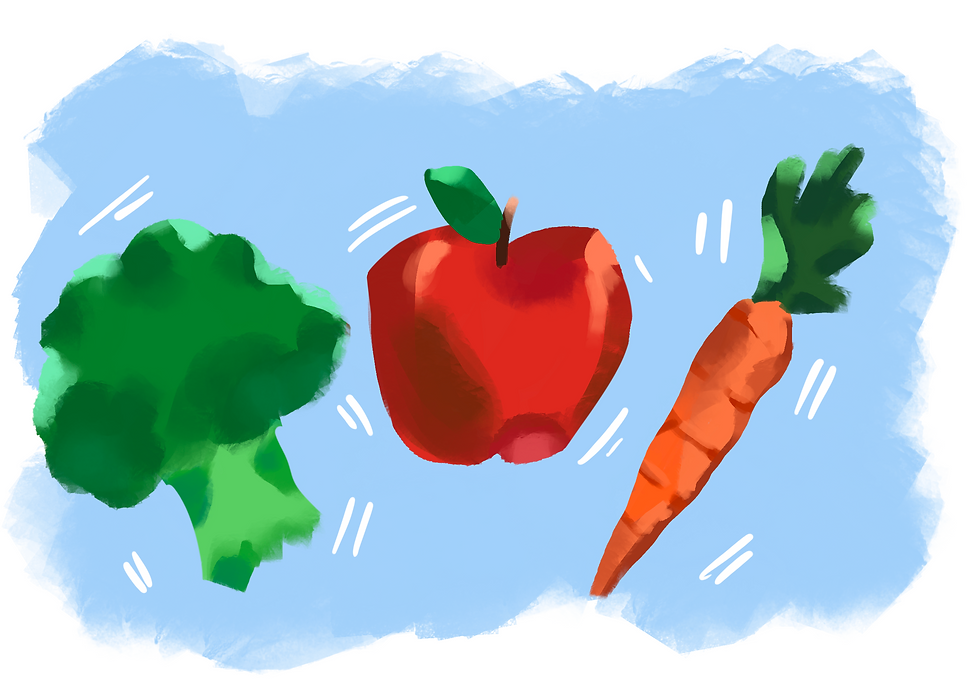Diet: What is Best for You?
- Science Holic
- Jul 2, 2023
- 3 min read
Updated: Jul 2, 2023
Author: Ellie Wang
Editors: Jasleen Matharu, Shirley Chen, and Yanxi Chen
Artist: Tiffany Gao
Many of us have some idea of what a balanced diet looks like. Whether we learned that from infographics, with an image of a plate split into uneven quarters for different food groups or a food pyramid. Perhaps you have seen advertisements for multivitamins or other pills that claim to have a multitude of health benefits. Maybe you’ve peered at a dietary label on the packaging of your favorite snack. But with access to all this information comes confusion. How exactly should one ensure a balanced diet?
Humans consume food for two main purposes: to supply themselves with energy and to obtain necessary substances that they can’t produce themselves. That energy can be quantified as calories. Technically, a calorie is defined as the amount of energy required to raise the temperature of 1 gram of water by 1 degree Celsius. The calories listed on dietary labels are actually kilocalories or 1000 calories. Carbohydrates (sugars) and proteins provide 4 calories per gram, while fats provide 9 calories per gram. To know how many calories you should consume in a day, you have to take into account your age, gender, and activity level. Generally, men need more calories than women and adolescents need more than children. The quantity of calories required hits a peak in adults aged 18-25 and decreases as one ages.

Overall, you should try to eat more whole foods that provide more nutritional value for the number of calories they contain, such as foods that include vitamins, minerals, fiber, carbohydrates, and proteins. You should also limit nutrient-poor foods such as processed foods, refined grains and sugars, sweetened drinks, red meats, and high-glycemic (high-sugar) foods. In addition, unsaturated fats should be consumed to fulfill the body’s need for fats. Unsaturated fats aren’t as high in calories as saturated and trans fats, since those fats aren’t as packed with hydrogen atoms like the other two types. This is because when a single bond between a hydrogen and carbon atom becomes carbon double bonds, it creates “kinks” in the carbon chain, creating imperfect packing, which leads to unsaturated fats staying liquid at room temperature. Thus, healthy fats include various types of oils—not butter, margarine, or other solid fats. However, sticking to a nutritious diet doesn’t mean that you have to give up your favorite foods and snacks. You can supplement your favorite foods with healthy additions, like adding fresh or frozen vegetables to your meat and seafood or make healthy substitutions, such as using vegetable oil to fry your pancakes instead of butter. As long as you balance your comfort foods with healthier ones and good amounts of exercise, you can maintain a healthy and nutritious diet.
Aside from gaining energy, another important aspect of eating food is to get otherwise unobtainable nutrients, which include vitamins and minerals. Vitamins are organic substances mostly classified as either fat-soluble or water-soluble. Fat-soluble ones (vitamins A, D, E, and K) dissolve in fat and accumulate in the body, so they should be consumed in lower amounts than water-soluble ones (vitamin C, B-complex vitamins, and folate), which must be dissolved in water before absorption, so they cannot be stored and are lost through urine if unused. On the other hand, minerals are inorganic substances found in soil and water, which are absorbed by plants and consumed by animals. Common minerals include calcium, sodium, and potassium, while trace minerals needed in very small amounts include copper, iodine, and zinc.

One ambiguous part of nutrition is the importance of antioxidants. These are artificial or natural substances that might prevent or delay some kinds of cell damage. Vegetables and fruits are full of them. In the media, antioxidant supplements are commonly touted to prevent aging—a type of cell damage that everyone experiences. While there is ample evidence to support a diet high in vegetables and fruits, studies haven’t found any on whether or not antioxidant supplements can prevent chronic diseases like cardiovascular disease and cancer. There is even some evidence to support claims that high doses of antioxidants could be linked to health risks, such as high doses of beta-carotene increasing the risk of lung cancer in smokers. For now, there aren’t any concerns raised over antioxidants in foods by the FDA which means most of them can be eaten without worries.
If you still have questions and concerns, you can consult your doctor or a dietitian on what kind of diet is best for you.
Citations:
“What Is A Balanced Diet?” Food and Nutritional Information Center (FNIC), National Agricultural
Library , WebMD Editorial Contributors, edited by Jabeen Begum, 8 April 2021, www.webmd.com/diet/what-is-a-balanced-diet.
“Healthy Eating for a Healthy Weight.” Centers for Disease Control and Prevention, 3 June 2022,
www.cde.gov/healthyweight/healthy_eating/index.html.
“Vitamins and Minerals.” The Nutrition Source, National Center for Complementary and Integrative
Health, 15 Sep. 2022, www.hsph.havard.edu/nutritionsource/vitamins.
“Antioxidants: In Depth.” NCCIH , Nov. 2013, www.nccih.nih.gov/health/anitoxidants-in-depth.



Comments